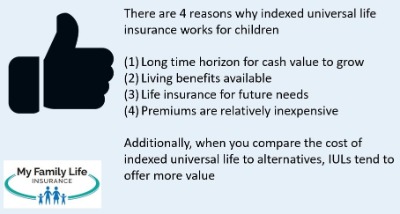All Categories
Featured
Table of Contents
1), often in an attempt to beat their classification standards. This is a straw male disagreement, and one IUL people like to make. Do they compare the IUL to something like the Vanguard Total Stock Market Fund Admiral Show no tons, an expenditure ratio (EMERGENCY ROOM) of 5 basis points, a turn over ratio of 4.3%, and an exceptional tax-efficient document of circulations? No, they contrast it to some dreadful actively taken care of fund with an 8% lots, a 2% ER, an 80% turnover proportion, and an awful document of short-term capital gain distributions.
Mutual funds usually make annual taxable distributions to fund owners, also when the value of their fund has gone down in worth. Mutual funds not just require earnings reporting (and the resulting yearly taxation) when the mutual fund is rising in worth, but can likewise enforce income taxes in a year when the fund has actually dropped in worth.
That's not just how common funds work. You can tax-manage the fund, gathering losses and gains in order to reduce taxed circulations to the investors, yet that isn't in some way going to transform the reported return of the fund. Just Bernie Madoff types can do that. IULs prevent myriad tax obligation catches. The possession of mutual funds may need the shared fund proprietor to pay approximated taxes.

IULs are simple to position to make sure that, at the proprietor's death, the recipient is not subject to either revenue or inheritance tax. The very same tax obligation reduction techniques do not function nearly as well with common funds. There are countless, typically expensive, tax catches linked with the moment acquiring and selling of common fund shares, catches that do not apply to indexed life Insurance policy.
Chances aren't extremely high that you're going to be subject to the AMT because of your common fund circulations if you aren't without them. The remainder of this one is half-truths at best. While it is real that there is no revenue tax due to your beneficiaries when they acquire the profits of your IUL plan, it is additionally real that there is no income tax obligation due to your successors when they acquire a shared fund in a taxed account from you.
Universal Life Insurance Companies
The federal estate tax obligation exemption limit is over $10 Million for a pair, and growing each year with inflation. It's a non-issue for the substantial majority of medical professionals, a lot less the rest of America. There are far better ways to avoid inheritance tax issues than getting financial investments with low returns. Common funds might create revenue taxes of Social Protection advantages.

The growth within the IUL is tax-deferred and might be taken as tax obligation cost-free revenue via fundings. The policy owner (vs. the mutual fund supervisor) is in control of his/her reportable income, thus enabling them to minimize or even eliminate the taxation of their Social Protection benefits. This set is great.
Below's another marginal concern. It holds true if you get a shared fund for state $10 per share prior to the distribution day, and it distributes a $0.50 distribution, you are after that mosting likely to owe tax obligations (most likely 7-10 cents per share) although that you have not yet had any type of gains.
In the end, it's really regarding the after-tax return, not how much you pay in taxes. You are mosting likely to pay even more in taxes by utilizing a taxed account than if you buy life insurance policy. You're additionally most likely going to have more cash after paying those taxes. The record-keeping needs for owning shared funds are significantly a lot more intricate.
With an IUL, one's documents are maintained by the insurer, copies of yearly declarations are sent by mail to the owner, and circulations (if any) are completed and reported at year end. This set is likewise type of silly. Naturally you must maintain your tax obligation records in case of an audit.
Universal Life Insurance Cost Calculator
All you have to do is shove the paper into your tax folder when it turns up in the mail. Rarely a reason to purchase life insurance policy. It's like this person has never ever purchased a taxable account or something. Mutual funds are commonly part of a decedent's probated estate.
Additionally, they are subject to the hold-ups and costs of probate. The profits of the IUL plan, on the various other hand, is always a non-probate distribution that passes beyond probate straight to one's called beneficiaries, and is as a result not subject to one's posthumous financial institutions, undesirable public disclosure, or similar hold-ups and prices.
We covered this one under # 7, but just to summarize, if you have a taxable shared fund account, you must place it in a revocable count on (or even much easier, make use of the Transfer on Death classification) to avoid probate. Medicaid incompetency and lifetime income. An IUL can supply their proprietors with a stream of earnings for their entire lifetime, no matter how much time they live.

This is advantageous when organizing one's events, and transforming assets to revenue prior to a nursing home arrest. Common funds can not be converted in a comparable manner, and are often thought about countable Medicaid assets. This is another stupid one supporting that bad individuals (you recognize, the ones who need Medicaid, a government program for the bad, to spend for their retirement home) ought to utilize IUL rather than mutual funds.
Seguros Universal Insurance
And life insurance looks horrible when compared fairly against a retired life account. Second, individuals that have money to purchase IUL above and past their retirement accounts are going to have to be awful at handling money in order to ever receive Medicaid to spend for their assisted living home expenses.
Persistent and incurable disease rider. All plans will enable an owner's easy accessibility to cash from their policy, often forgoing any type of surrender charges when such people endure a significant disease, need at-home treatment, or end up being restricted to a nursing home. Common funds do not provide a similar waiver when contingent deferred sales costs still apply to a mutual fund account whose proprietor requires to sell some shares to money the costs of such a stay.
Nationwide Indexed Universal Life
You get to pay more for that advantage (motorcyclist) with an insurance plan. Indexed universal life insurance coverage offers death advantages to the beneficiaries of the IUL proprietors, and neither the owner nor the recipient can ever shed cash due to a down market.
Currently, ask yourself, do you in fact require or want a fatality advantage? I definitely don't require one after I reach financial freedom. Do I desire one? I intend if it were affordable enough. Of course, it isn't cheap. On standard, a purchaser of life insurance policy pays for real expense of the life insurance policy advantage, plus the costs of the plan, plus the earnings of the insurance business.
Ul Mutual Company
I'm not totally sure why Mr. Morais included the entire "you can not shed cash" again below as it was covered rather well in # 1. He just intended to duplicate the most effective marketing point for these points I expect. Again, you don't lose nominal bucks, yet you can shed real dollars, along with face severe opportunity expense as a result of low returns.

An indexed universal life insurance policy policy owner may trade their policy for a totally different plan without setting off income taxes. A mutual fund owner can stagnate funds from one shared fund company to one more without offering his shares at the previous (therefore causing a taxed event), and buying new shares at the latter, commonly based on sales fees at both.
While it is real that you can trade one insurance plan for an additional, the reason that individuals do this is that the first one is such a dreadful plan that even after buying a new one and experiencing the early, negative return years, you'll still come out in advance. If they were marketed the right plan the very first time, they shouldn't have any type of desire to ever trade it and go with the early, adverse return years once more.
Table of Contents
Latest Posts
Ffiul Insurance
Best Iul Provider
Index Life Insurance Companies
More
Latest Posts
Ffiul Insurance
Best Iul Provider
Index Life Insurance Companies